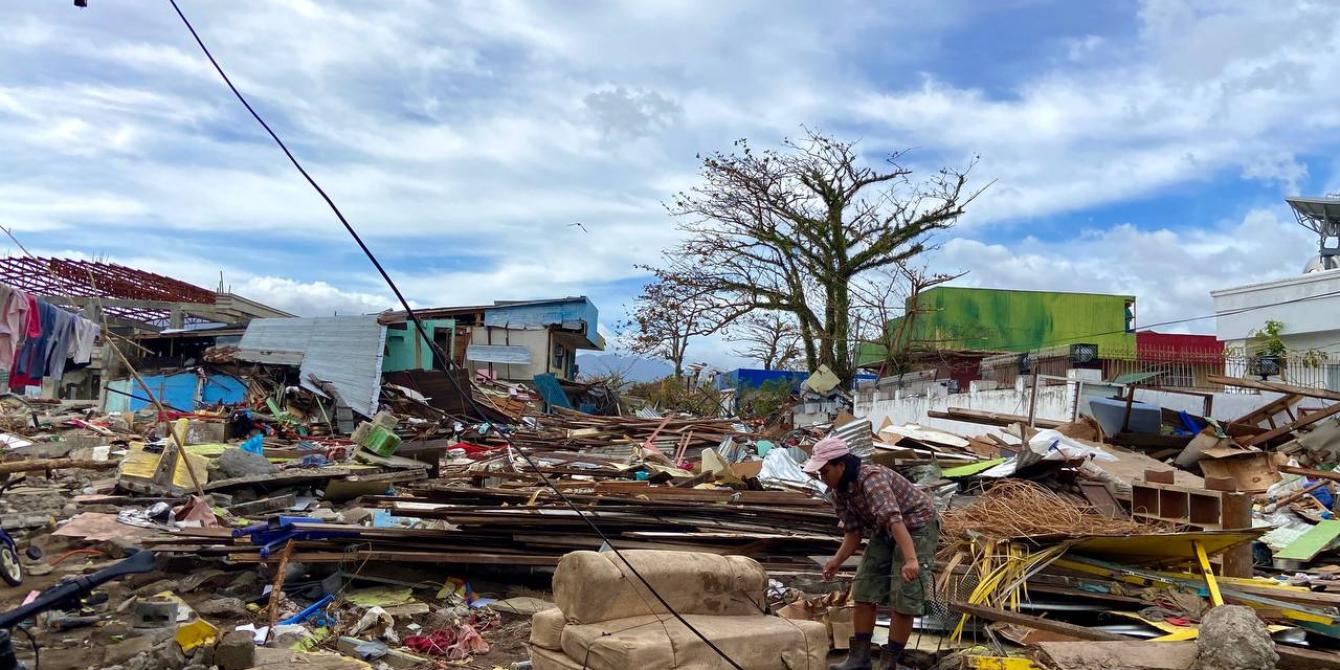Oxfam appeals for support in rebuilding typhoon-damaged houses to decongest evacuation centers

Humanitarian group Oxfam Pilipinas on Tuesday called on government and the private sector to prioritize the distribution of shelter repair materials on top of food and water for typhoon-hit communities.
“Typhoon survivors already spent Christmas in evacuation centers; let’s not keep them there for New Year’s Day too as we are still battling the COVID-19 pandemic,” Oxfam Pilipinas Country Director Lot Felizco said.
Felizco said the distribution of construction materials, which were requested both by residents and local government officials, will allow typhoon survivors to repair and rebuild their homes. “This will in turn help decongest evacuation centers,” Felizco said.
While COVID-19 cases in the Philippines is much lower now compared to previous months, other countries are experiencing a surge in new cases due to the Omicron variant.
As of December 27, the government reported that 4.5 million Filipinos across 10 regions have been affected and displaced by Typhoon Odette (international name: Rai). Initial monitoring showed that at least 400,000 houses were damaged — 127,000 of which were completely destroyed.
The government also logged 378 deaths and 60 missing people.
Reports from Oxfam staff on the ground showed that evacuation centers are currently cramped with some rooms being occupied by three to four families at a time.
“This raises major health risks as it is impossible for them to observe physical distancing,” Felizco said.
The Oxfam Country Director pointed out that they are also worried about the safety of women and children as there are no room partitions between families. In some evacuation centers, people are also forced to bathe in open areas due to the continuous low water supply.
“The lack of water and sanitation facilities make frequent hand washing and proper hygiene habits more challenging for typhoon survivors,” Felizco said.
In Surigao del Norte, it might take 3 to 4 months before electricity is fully restored. “Based on Oxfam’s experience supporting internally-displaced communities, the lack of electricity is also a safety concern and the use of gas lamps at night is a fire hazard.
In some areas affected by Typhoon Odette, residents are already staying in makeshift houses built from salvaged materials. “These are not sturdy or safe enough as rainfall is continuous in some parts of the country,” Felizco said.
SUPPORT FOR AFFECTED AREAS
Through the support of groups such as the European Civil Protection and Humanitarian Aid Operations (ECHO), Oxfam Pilipinas and partner organizations in the Philippines have been distributing resources to typhoon survivors.
In Siargao, Oxfam and partner United Youth of the Philippines-Women (UnYPhil-Women) have distributed 200 hygiene kits, 200 sleeping kits, and 200 water kits for the island barangay in San Fernando, Del Carmen town.
Oxfam and partner Community Organizers Multiversity are also currently transporting 500 food packs, 500 hygiene kits, 150 sleeping kits, 300 water containers, 90 boxes of aquatabs, and 50 shelter kits to island barangays of Caub in Del Carmen; Mabini and Dayahoay in Pilar town.
Oxfam and local organization SIKAT will be conducting hygiene promotion sessions and will be distributing 1,000 hygiene and water kits with aquatabs with support from UNICEF in General Luna.
Oxfam Pilipinas, which is conducting regular assessment on the situation of typhoon-hit communities, is also deploying solar packs to support SIKAT and the Municipal Disaster Risk Reduction and Management Offices of Padre Burgos and Macrohon in Southern Leyte.
Oxfam Pilipinas is a humanitarian and development organization that has been addressing the root causes of poverty and inequality in the Philippines in the last 30 years. It is part of an international confederation of organizations present in 90 countries.
FOR MEDIA INQUIRIES AND COORDINATION:
Kristine Sabillo-Guerrero
Senior Officer for Media and Digital Influencing, Oxfam Pilipinas
Email: kGuerrero@oxfam.org.uk

 Follow us on Facebook
Follow us on Facebook Instagram
Instagram Follow us on Twitter
Follow us on Twitter LinkedIn
LinkedIn